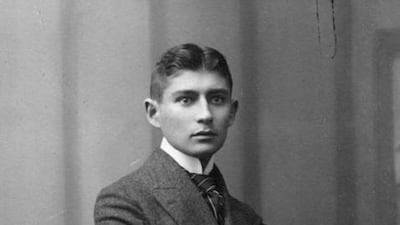It has been an engrossing year for the literary world. The surprise release of Harper Lee's Go Set a Watchman sparked fierce debate about the ethics of publishing previously unknown or forgotten works.
Beyond America’s shores, another towering literary figure is at the centre of an international controversy that is raising old questions about the cultural identity of a small Middle Eastern country.
The ownership of unpublished manuscripts and novels written by Franz Kafka, the Czech-Jewish writer widely regarded as one of the 20th century's greatest German-language authors, is pitting Israel against Germany.
Ever the tortured artist, Kafka left his writing desk full of unpublished manuscripts to his friend and close confident Max Brod, a fellow intellectual from Prague. He gave explicit instructions for everything to be burnt uponhis s death. Brod ignored these wishes and in 1939 smuggled Kafka’s estate out of Prague in a suitcase to Palestine.
With the help of the German-born publisher of the Israeli liberal daily Haaretz, Salman Schocken, Brod published what became Kafka's best-known and loved works, including the novels The Trial and The Castle and various short stories.
For reasons that are unclear, Brod did not publish all of the Kafka manuscripts in his possession nor did he hand them over to Mr Schocken. It is these remaining works that have set off a fierce debate between Germany and Israel about who owns Kafka’s legacy.
When Brod died in 1968, his secretary and lover, an Israeli named Esther Hoffe, acquired the rest of Kafka's manuscripts. The full extent of what she received from Brod remains unclear, but it is said to have included unpublished novels, short stories and correspondence between Brod, Kafka and other notable writers of the time, including the Viennese Stefan Zweig, the inspiration for the recent Hollywood film The Grand Budapest Hotel.
The existence of these manuscripts was unknown to anyone outside of the Hoffe family until 2007. The contents were placed in safe deposit boxes in Tel Aviv and Zurich, and some were left in Hoffe’s flat in Tel Aviv. In 2007, Hoffe died and bequeathed her estate to her daughters, who announced that they wished to sell the entire archive in Germany.
Needless to say, the prospect of unread and unpublished Kafka material shook the literary world, particularly German linguists, who see Kafka’s work as a pillar of the modern German language.
In 1988, Esther Hoffe sold the original manuscript of the The Trial to the German Literature Archive in Marbach through a Swiss manuscripts dealer. The Swiss dealer purchased the work for £1 million at Sotheby's in London.
At that point, nothing had been said of the unpublished Kafka manuscripts. The purchase of The Trial made Germany's intentions about collecting and safeguarding the physical remains of Kafka's legacy clear. In their eyes, Kafka's legacy belonged in Germany thanks to his monumental contribution to the language and culture.
Brod, on the other hand, had other feelings about where Kafka’s work belonged. An ardent Zionist, who tried in vain to convince Kafka to join him in British Mandate Palestine, Brod categorically rejected the possibility that Kafka’s literary estate be transferred to an archive in Germany. That Kafka’s three sisters were murdered by the Nazis added fuel to his fire. However, Brod was never given any authority to act as Kafka’s estate executor. In fact, he was instructed to burn all the manuscripts.
When Eve Hoffe, the daughter of Esther Hoffe, announced in 2007 that she would sell the unpublished works to the Germans, the state of Israel intervened. After a lengthy trial that ended last month, an Israeli court ruled that Kafka’s work must be transferred to the Israeli National Library and that it must not leave the country. Rehashing Brod’s arguments, Judge Kobi Vardi argued that as a Jew, Kafka’s work belonged in Israel because it was a cultural asset of the Jewish people.
This extraordinary saga continues to unfold. In 2007, the Hoffe family apartment in Tel Aviv was broken into by unknown persons. This month, German police seized a trove of Brod’s letters that were allegedly smuggled out of Israel. The police are staying silent about the documents’ provenance, but they may have been stolen in the break-in at the Hoffe flat.
Aside from the intrigue and the possibility of unpublished Kafka manuscripts, the question this fight raises is a profound one.
Who owns Franz Kafka? For Israel, the self-described “Jewish State”, Kafka belongs to Israel. The writer would probably have had different thoughts.
During his lifetime, Kafka flirted with the idea of Zionism but ultimately rejected the prospect of moving to Palestine. He did enrol in basic Hebrew classes in Prague but reportedly gave up in frustration. Kafka’s identity was rooted in Europe, and while he may have felt that he was on the margins of European society because of his religion, he never joined the Zionist project in Palestine, despite intense persuasion from fellow intellectuals.
Perhaps the better question is why Israel feels the need to control and dominate the legacy of non-Israeli Jews? The fact that the Zionist movement was and remains unable to compel the majority of global Jewry to participate in its colonial attempts at state-building in Palestine is a source of great frustration in Tel Aviv.
Therefore, Israel feels compelled to fight over the legacy of writers like Kafka in an attempt to claim ownership over their reputation. Israel, a nation state, claims to be the sole representative of Jews everywhere and always. This misplaced ownership of Jewish culture will remain at the heart of the Zionist movement until it is finally comfortable in its own skin.
jdana@thenational.ae
On Twitter: @ibnezra

